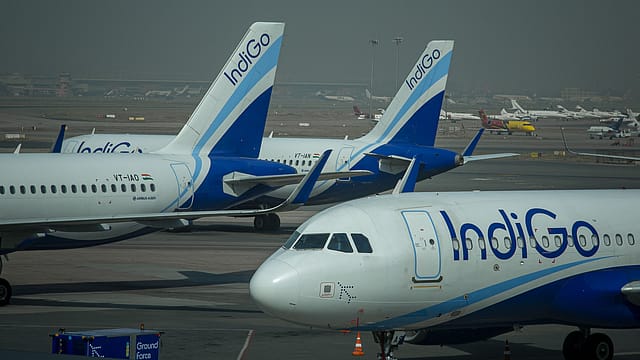IndiGo profit falls 20% to ₹2,176 crore in turbulent Q1 for Indian aviation
ADVERTISEMENT

InterGlobe Aviation , the operator of India’s biggest carrier IndiGo, reported a 20% year-on-year decline in its net profit at ₹2,176 crore for the quarter ended June amid a challenging environment marked by geopolitical tensions, airspace restrictions and the tragic accident of rival Air India’s London-bound flight AI171. IndiGo’s revenue from operations rose 4.7% year-on-year to ₹20,496 crore for the June quarter.
Following the terrorist attack in Pahalgam on April 22, India launched ‘Operation Sindoor’ in May, which led to airspace restrictions in the northern and western parts of the country for several days. Pakistan, too, blocked its airspace for Indian carriers, forcing airlines to take longer routes for international flights.
“The airspace closure has clearly impacted Indian aviation. We have a certain set of routes which cannot be operated. I think there are two or three destinations in Central Asia which we had to temporarily suspend. There are a handful of destinations in the Middle East where we need to circumvent Pakistani airspace. Clearly, that has an impact on our results and during ‘Operation Sindoor’ we had a total of 170 flights daily which we had to cancel,” Pieter Elbers, CEO of IndiGo, said in a media conference call after the company announced its earnings.
“In the month of June, we were shocked by the AI171 tragic accident. All in all, this has led to some impact on the market,” Elbers added.
Notwithstanding these headwinds, IndiGo’s passenger volumes grew 12% year-over-year to 31 million customers in Q1 FY26, reflecting resilient demand.
“Despite these adverse market situations, the Indian aviation market showed remarkable resilience by still having a market growth in the range of 5-6%,” said Elbers.
IndiGo’s yield, the average amount of revenue received per paying passenger flown per kilometre, fell 5% year-on-year to ₹4.98 in Q1 FY26. Passenger load factor, a metric to measure the percentage of available seats filled, declined by 2.1 points to 84.6%. The airline's carrying capacity measured in available seat kilometres (ASKs) jumped 16.4% year-on-year for the first quarter. For the second quarter of the financial year 2025-26, IndiGo forecasts capacity in terms of ASKs to increase by "mid to high single digit" as compared to the second quarter of FY25.
Despite several industry-wide disruptions, IndiGo reported a net profit margin of around 11% for the quarter ended June.
“Comparing this to all the adverse events happening in Q1, we have demonstrated that the market is very resilient and IndiGo has the ability to quickly adjust to market circumstances,” said Elbers.
On the airline’s premium offering, Stretch, Elbers said IndiGo is seeing a gradual increase in load factor on the Delhi-Mumbai route, which has completed six months. “Clearly, it has taken a bit of time for the market to be fully aware of the product. Some flights in very early morning hours and late hours are taking a bit more time. But I would say the market is responding very well to Stretch,” he said. IndiGo offers Stretch on key domestic and some international routes.
The Gurugram-based airline is also increasing flight frequencies on its recently launched long-haul routes connecting Mumbai with Amsterdam and Manchester. Starting September 20, 2025, IndiGo will fly 6 times per week between Mumbai and Amsterdam, and further increase it to daily service from 13 October 2025. Additionally, the connectivity between Mumbai and Manchester will be enhanced to 4x weekly, with effect from September 22.
IndiGo also announced extension of its codeshare agreement with KLM, the flag carrier of the Netherlands, offering enhanced connectivity to IndiGo customers across Europe and the UK on KLM’s network. The agreement will allow IndiGo to place its code on KLM operated routes to 30 destinations across these regions, via Amsterdam. IndiGo recently commenced its nonstop, long-haul operations from Mumbai to Amsterdam using its Boeing 787-9 Dreamliner aircraft, damp-leased from Norse Atlantic Airlines.